"Bad girl" gone good
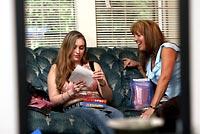
It was a private summer camp of sorts: a 200-acre nature reserve in the middle of the Skykomish River.
But Isaiah was the only kid.
"We had to cross a river," he begins, reminiscing with his mom about their wooded hideaway. "It was up to my neck when I was 6. I had to hold your hand. You'd walk across while I kicked and splashed."
The 8-year-old boy warms to his tale, accenting it with colorful details. They had to cross railroad tracks; he noticed if police cars were around; his life preserver was red. And after fording the river to reach their island retreat, they followed a trail through the brush that his mom's boyfriend had hacked with a machete.
When mom Mindy McConnell, 26, steps up to the podium today at the Everett Events Center to help raise money for YWCA programs that helped transform her life, she, too, will talk about that camp.
Midway into her speech, she's likely to pause, then gesture to a slide showing the camp's cedar-shake shack — her former boyfriend's methamphetamine lab on a river island near Gold Bar, her hometown.
Snohomish County sheriff's deputies busted the lab in December 2004, two months after McConnell had left him and kicked her 10-year addiction.
"We lived wherever he could cook meth," goes the story she plans to tell. "We lived in the woods, camping in tents or in trailers, even under tarps in a hollowed-out tree trunk. ...
"When Isaiah talks about that time, he'll say, 'That was when you were on drugs and we lived in the woods. I didn't have my own room then. But I had my own tent.' "
Now Isaiah has his own room in an immaculate Edmonds apartment subsidized with public and private money.
His emotional world is tidier, too. He's reveling in a closer relationship with his mother, who had spent most of his childhood "tweaked" on meth. Now she's clean, sober and juggling her newly embraced motherhood role with college classes and a part-time job.
When asked about their emotional bond, McConnell grows serious.
The YWCA of Seattle, King County and Snohomish County has provided much more than shelter and a helping hand toward independence, she said. It's given them invaluable counseling — play and family therapy, parenting classes and support groups — to help heal years of damage.
Isaiah witnessed and remembers a lot. Recently, for instance, McConnell was surprised to hear him state, matter-of-factly, that he knows the difference between three smoky smells — cigarettes, marijuana and meth.
He teases her sometimes in a loving yet cutting fashion.
"When my mom was doing drugs, she was a stupid crackhead," he joked, while play-wrestling with McConnell on their living-room couch.
"Hey, hey," she protested, then laughed.
He laughed, too, and added, "Well, you were."
"Bad girl" aspirations
Growing up in Gold Bar, McConnell became enamored with a "bad girl" image she'd absorbed through the popular media.
"I used to identify with the rocker slut that was doing the drugs, drinking the beer and having the sex," she recalled. "That's what I aspired to be, like the bad girl in 'Grease.' "
McConnell was 10, a fifth-grader at Gold Bar Elementary School, when she got mad one day, filched two of her stepfather's Winston cigarettes and drank one of his Schmidt's beers.
"It went toward the lifestyle I always thought I wanted," she said.
McConnell smoked pot for the first time about a year later. She got it from a friend's older sister.
Then, at 15, she went to a kegger in Skykomish that changed the course of her youth. She discovered the sinister, addictive thrill of meth. She dropped out of Sultan High School near the end of her freshman year.
"School interfered with my drug career," she explained.
The next decade was a blur. When you're up for days at a time — smoking, snorting, eating or injecting meth — time runs together. McConnell tried many drugs: speed, opium, Ecstasy, acid, mushrooms, cocaine, hash, inhalants and more-obscure hallucinogens such as GHB and sherm.
Along the way, she had a baby, Isaiah, and settled down with a long-term boyfriend who cooked and sold meth for a living.
Now, McConnell's life has come into crisp focus. Two weeks ago, she attended her first class at Edmonds Community College. She's worked since October in the Mountlake Terrace headquarters of the Mount Baker-Snoqualmie National Forest, first as an intern and now as a personnel assistant.
She's discovering a natural leadership talent and a skill for public speaking.
She has memorized the speech she'll give in Everett today. Last month, she delivered her talk at similar YWCA fundraising luncheons in Bellevue and Seattle.
"In Bellevue, there wasn't a dry eye in the audience," said YWCA family advocate Maria Bighaus. "She's wonderful, very passionate, and she believes in what she's saying."
McConnell's speech also inspired guests at the first two luncheons to reach for their checkbooks. The Seattle luncheon raised $723,000; the Bellevue event brought in nearly $464,000.
"She just opens herself. Her story gives a lot of hope, that people can come back from that and succeed," said Monette Menny, McConnell's first caseworker when she and Isaiah moved into the YWCA's Pathways for Women emergency shelter in January 2005.
Candid about drug use
McConnell, intelligent and articulate, speaks quickly and candidly as she recounts the daily hell of meth addiction. She relates complex stories with blunt honesty and few apologies for whom she used to be.
Like when she bottomed out over Mother's Day weekend when Isaiah was 2. McConnell hadn't slept in a week, had just tried injecting meth intravenously for the first time, and hallucinations had set in. She mistook overdose symptoms — excruciating cramps in her back — for stabbings inflicted by imaginary people she thought wanted to kill her.
"Why didn't I quit then? The thought of not getting high again didn't even register with me," McConnell said. "I just needed to take a couple days' break so my body could recover."
In the beginning, before the addiction sets in, meth imparts a feeling of euphoria.
"You're inspired to do great and wonderful things," McConnell said.
That's why meth is so insidious. Users devote their lives to "trying to chase that feeling, just the contentment," McConnell said. But that proves to be impossible.
"You're just so aggravated and frustrated all the time. It's like drinking too much coffee — that edgy feeling, times 100. You can't wash your dishes because you're not high enough. Or because you're too high. You can never get that balance."
Isaiah, now a second-grader at an Edmonds school, has a simpler description.
"It makes your mind explode," he said.
McConnell said her decision to quit, and try to change her life, happened over a period of months.
In September 2004, she and Isaiah, who was just starting first grade, were evicted from their Gold Bar apartment. Her boyfriend still was living near his meth lab on what drug investigators later dubbed "Gilligan's Island."
McConnell decided to move in with her mother, Ruth Roman, who for years had fretted about their well-being. Once, years before, she had persuaded McConnell to check into a detox program. It didn't last.
"It was a nightmare," Roman said. "She wasn't my Mindy. She was out in a dream somewhere. In reality, there was no reality for her."
As McConnell's addiction worsened, Roman tried to spend as much time as possible with Isaiah — when he wasn't living on the island or at some other remote meth-lab site. Roman worked full time, but on her days off she found ways to keep him at her Gold Bar house. When he entered kindergarten, she began picking him up after school.
"I bothered Mindy daily, sometimes more than daily, to make sure they were eating, to check on my grandson," Roman said.
"Every minute I could pull him away, I would."
McConnell said her meth use already had started to taper off before she moved back into her mother's house. Once there, it was awkward to continue a hard-core habit.
"I started growing up," McConnell said.
Roman accompanied Mc-Connell to an office of the state Department of Social and Health Services, where a counselor told her she could qualify for financial assistance if she completed outpatient drug treatment. So she enrolled at Evergreen Manor in Everett and joined a 12-step recovery program.
McConnell's "clean date" was Oct. 11, 2004.
She heard about the Pathways for Women shelter in January 2005 and signed up for the YWCA's waiting list. Two weeks later, she and Isaiah moved in.
They spent eight months at the Lynnwood shelter, first as emergency-shelter guests and later as transitional-housing residents. Their room was so tiny, the trundle mattress beneath McConnell's single bed couldn't pull out all the way. They shared a kitchen, bathroom and common room with four other families.
McConnell stood out from the start, said YWCA's Bighaus, McConnell's current housing manager. She had striking good looks, a strong sense of self and a "punk" personal style symbolized by her black leather dog-collar necklace.
"She was very outspoken — in a good way," Bighaus said. "She had a very determined personality, and she was very much committed to her recovery. She talked a lot about it and the way it felt."
It wasn't easy in the beginning. McConnell had to obey rules, including a curfew, for the first time in her adult life and to learn communication skills to endure the communal-living environment. Her counselors said she worked hard and took advantage of every learning opportunity available.
Pathways gradually moves families from the emergency shelter, which is free, into transitional-housing arrangements with a sliding-fee approach to rent that's based upon income, including welfare payments, job income and child support.
McConnell and Isaiah moved into their apartment in September. The 120-unit complex is owned by the Housing Authority of Snohomish County, but it charges market rents. A dozen units, including McConnell's, are designated as subsidized transitional housing and get grant support from the Bill & Melinda Gates Foundation. Counseling and administrative services are provided by the YWCA.
On moving day, Roman helped McConnell get a driver's license and bought her a car: a silver 1995 Mercury Sable now decorated with stickers such as "Visualize Recovery" and "Igniting the Desire: Clean and Free."
McConnell had to pay utility costs after the first three months but doesn't yet pay rent. Next September, she'll qualify for federal Section 8 housing vouchers.
She loves her new responsibilities.
"The first of the month is so fun because I get to pay bills," she said. "It feels good because I can. It's awesome. I feel like I can do anything."
Anything, that is, except drugs.
"Nothing makes me want to be high again. When I wake up every day, I get this feeling of contentment, of being in my own skin," McConnell said.
"It's that feeling I was searching for."
Diane Brooks: 425-745-7802 or dbrooks@seattletimes.com
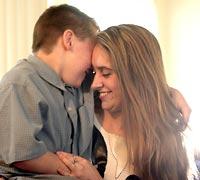
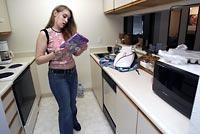

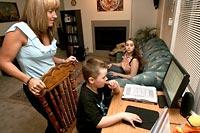
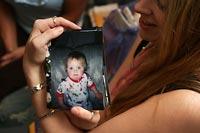
More information
![]()
![]()
Fundraiser
Mindy McConnell will speak at a fundraising luncheon today for the YWCA of Seattle, King County and Snohomish County. Also scheduled to speak is Linda Armstrong Kelly, the mother of seven-time Tour de France winner Lance Armstrong.
Those who attend the noon luncheon at the Everett Events Center will be requested to make donations of at least $100. Pre-registration is required and can be made at 206-461-4450 or www.ywcaworks.org.
How to help
The YWCA of Seattle, King County and Snohomish County provides emergency and transitional shelter, counseling and other support services for women and their families. To make a donation, call 206-461- 4448, go to www.ywcaworks.org and click "donate," or send a check to the YWCA, Attention: Development, 1118 Fifth Ave., Seattle, WA 98101.